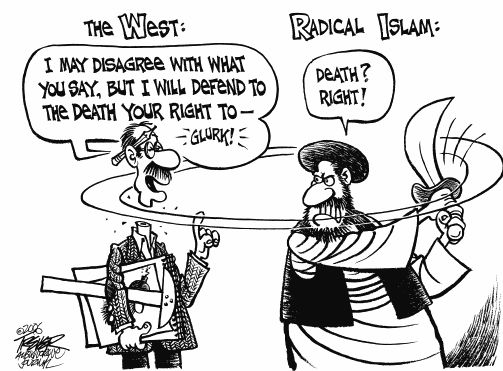From here:
If religious criticism is intended deliberately to offend, to vilify or to slander, it is not acceptable and I would be outraged. And not just for my own religious faith, but also for others’. I am not against satire. I am against hatred. If satire is intended respectfully to challenge or question a fundamental belief, or to expose the hypocrisy of the institution or its leaders, it is perfectly okay.
There is no unlimited right to freedom of speech and no absolute right to freedom. To exist, freedom needs self-imposed restraints, and democracy requires a consensus based on mutual respect. What we have in the Paris cartoons is a misuse of freedom…it is secular fundamentalism that insists on the right to cause offence in the name of freedom. Religious satire is not off-limits when it serves the public good by exposing hypocrisy and causing us to live up to our ideals in a better way, but when its purpose is deliberately to offend, how is that different from hatred?
Michael Ingham is in favour of satire and freedom of expression provided it is respectful and not offensive, thereby rendering it not free and not satirical. Additionally, satire has to serve the public good. Who decides this? In the absence of an ecclesiarchy, the state; welcome back to the Soviet Union.
In a similar vein, the imam pundit notes:
In a free society, people have the right to offend, but people do not have the right to incite hatred or to stereotype an entire community. When you depict Mohamed as a terrorist, 1.6 billion Muslims worldwide are considered terrorists, when 99.9 per cent of them are peaceful. We must use freedom of speech with responsibility. That is the price of keeping a civil society.
If the imam is correct and 99.9% of Muslims are peaceful (I have a suspicion that figure is too high), we are left with 1.6 million who are not only not peaceful but, since the context is terrorism, are terrorists; I don’t find that particularly reassuring.


